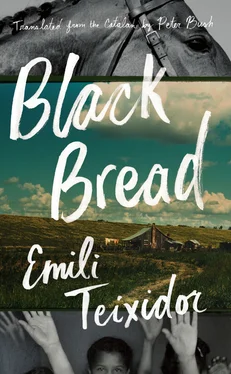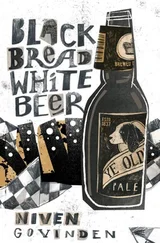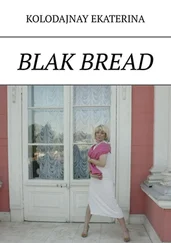Dad Quirze listened silently, as if he wasn’t listening at all.
“And what if the girl falls ill?” he piped, nodding, a glint in his beady eyes.
“What do you mean?” asked Ció, half fearfully. “You mean…?”
As usual at that time in the evening, after supper, Quirze and I were sitting at the other end of the table a long way from the fire and playing cards. In step with household tradition, Quirze and I were big lads now and nobody would have thought to exclude us from adult conversation. When they didn’t want us to hear something, they simply didn’t mention it in our presence. They never began a conversation they would have to cut short because of the presence of someone, let alone us. They certainly had their secrets and private conversations, but the first condition to guarantee secrecy was that nobody should even know they existed. A secret exposed to the view of someone was like a tightly closed drawer that had been put on display for everyone to see on top of the chest: it drew every gaze and aroused everyone’s curiosity. That’s why they talked freely about everything and we acted as if we couldn’t hear or understand them, and they did the same.
“That’s not a bad idea…” commented Grandmother Mercè, smiling.
When Father Tafalla was consulted, he didn’t find it a bad solution either. In extremis , they said he said. I thought it was strange for Saint Camillus Father Superior to agree to such a childish ploy, against the rigorous views expressed by the parish priest. It was then I suspected that there must be some secret link, some strange connivance, between my uncle and aunt, Dad Quirze in particular, and the monastery and its Father Superior.
One week before the May Sunday set aside for First Communion, Cry-Baby fell ill.
Cry-Baby slept in a small bed next to Grandmother’s big bed in a small room they called the alcove that led to a larger room separated off by white curtains gathered up by a thick rope hooked to the wall.
The large room had a wardrobe with a mirror, two chests of drawers, an armchair and an osier rocking chair, and the walls were packed with pictures of saints and Sacred Hearts.
Quirze and I slept on a couple of straw mattresses in the room where the hands and Bernat slept in three or four little beds and bolsters, though you never knew who’d be there because there were hands who could sleep there or go and spend the night in their own homes, depending on the demands of work. It was a room as big as the sitting room. And right opposite the hands’ room, or the boys’ room, as it was also called, was another door in a small passage that led to the girls’ room with two beds, where only Aunt Enriqueta slept. Aunt Ció and Dad Quirze slept in a room at the back of the living room that looked over the elder tree.
All the bedroom doors opened on to the sitting room and at the back were French windows to the gallery. The sitting room looked huge, and was full of chairs lined up against the wall, old paintings, bulging chests of drawers with saints stuffed inside glass domes, like the butterflies fading between the pages of our books, and two or three trunks, what they called crates.
The door to Grandmother’s room was old and there were lots of cracks in the ill-fitting timber. The door’s rustic roughness contrasted sharply with the relative elegance and cleanliness of the room and the alcove.
The day it was decided the little girl would fall ill, Ció and Enriqueta spring-cleaned the sitting room, bedroom and alcove; they put clean sheets and pillows on the two beds and a pink eiderdown with images of fantastic birds on the bigger bed, one Grandmother said was made of pure silk, a wedding present — it was antique! — as good as new, because, as we know, good things last a life time.
“That eiderdown must be real quality,” said Grandmother, “because the village borrowed it every year to decorate the balcony for the Corpus procession. Nothing could beat it. It gleamed like a pink, silken sun.”
Quirze and I were charged with the responsibility of telling the priest about Cry-Baby’s illness, and her probable non-attendance at catechism classes until her fever abated. The priest scowled and said nothing.
On Friday, Father Tafalla went to see the priest to suggest a solution: if he agreed, he could give the sick child communion on Sunday. However, the priest said under no circumstances, the girl must come to the parish church, ill or not, and that if she couldn’t come next Sunday, the one after, or next month, then let it happen as soon as she could get up.
Dad Quirze chuckled when Ció told him the outcome from Father Tafalla’s negotiations after supper.
“Any Sunday will do…” he repeated. “It could be in the middle of summer when everybody’s forgotten about all this.”
“If it’s all about not showing your face,” Grandmother repeated, “you’ve got what you wanted.”
“One of these mornings, the girl, the lads and I will go to morning mass,” Ció proposed, “and we’ll end this nonsense.”
“I couldn’t care less whether it is early morning mass, or solemn mass,” added Dad Quirze, “because they won’t be organizing any special ceremony for us.”
“In any case, people take communion in the Chapel of the Holy Sacrament and parishioners don’t take a blind bit of notice,” commented Ció.
Every day at school the teacher asked after Núria and Oak-Leaf too. Quirze and I always replied that she had some sort of fever: a horrible cold that could be flu or worse even, scarlet fever, because her neck was a deep red.
Uncle Bernat took the colt and trap to go fetch the village doctor; he was an elegant old man who always wore a hat and cravat and carried a small case as if he was setting out on his travels. That same day, at noon, Ció had given Cry-Baby a potent beverage of water boiled with stinking herbs; it immediately produced a violent sneezing fit and her face and neck flushed red as if she’d had a rush of blood to her head.
The doctor recommended rest, eucalyptus steam baths, a medical ointment from the chemist’s and hot towels on the chest. However he never said what in fact was wrong with her.
After First Communion Sunday, the parish priest himself took advantage of a half-holiday to visit the farmhouse accompanied by the Father Superior from Saint Camillus. Both strolled up in the afternoon under an open black umbrella to protect them from the sun. Both clutched a breviary, and Grandmother Mercè, who had spotted them coming along the path through the woods, shouted to us that two characters from the Nativity were on their way. As soon as she heard that, Ció began laying the table with the best napkins so as to invite them to have a bite to eat. Dad Quirze was out hiring the thresher, men to guide the oxen and teams of reapers and hands for the harvest. There was a lot of work to do.
“We just happened to walk past your house deep in our breviary prayers,” said the Father Superior, “so we thought we’d look in on the sick child.”
First they sat around the table and ate their snacks like two fine gentlemen with white napkins dangling from their necks like bibs, while they discussed the history of the village and neighbouring farmhouses.
They were fascinated by the story behind each house and their nicknames — Shepherd-boy’s, Always’s, Pretty Girl’s, Smocky’s and the bigger places like Tona’s, Soca’s or La Bruguera’s, or even the ruder tags like Dry Shit, Twisted Cock, Filthy Face or Dirty Whore — a subject on which Grandmother displayed an encyclopaedic knowledge. Now and then, the priest shamelessly asked about family members or business, like the whereabouts of Dad Quirze, whether he worked even on a Sunday, or whether Aunt Enriqueta was courting someone in Vic, thus making a meal of the fact that she went there every day to sew, or whether we weren’t overwhelmed by the constant visits from the women who worked in the factories in the small towns along the river who came to the farmhouse to ask for fresh bread or flour, potatoes or fresh eggs at knock-down prices or, in fact, to beg any food they could get.
Читать дальше












